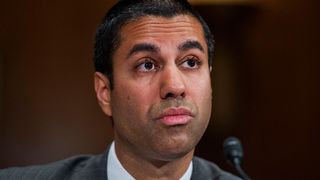Pai: Previous FCC's Ignored Key Diversity Initiative

That is according to FCC chair Ajit Pai in a speech to the Michigan Association of Broadcasters.
Pai was talking up the FCC's new incubator program to pair established broadcasters with women and minority owners, with the latter getting operational help, financing, mentoring and connections, and the former getting a carve-out from local ownership rules.
Various diversity advocates, from the Rev. Jesse Jackson to NCTA president Michael Powell, have pointed out that being in the room and part of the conversations when media properties are changing hands is one of the keys to diversifying ownership, and conversations and venues that minorities and women were excluded from for years.
Pai pointed out that the incubator proposal had been first offered up in 1990, then worked in one of the musical references he likes to offer up in public speeches and at meetings, saying that was "back when Bell Biv DeVoe dominated the charts with 'Poison.' The band warned us then that the 'situation is serious. Let’s cure it ‘cause we’re running out of time.'”
He (Pai) said that he didn't know whether the band had broadcast diversity in mind--odds are they didn't--but that, if they did, the Commission ignored them for 28 years—until last month, when we finally took action.
That would cover both Republican and Democratic FCC's.
Pai also took the opportunity to promote his process deregulation proposals--eliminating the main studio rule and paper filing requirements--and revamping kids TV rules, though he did not talk about the media ownership revamp elephant in the room--the proceeding to determine whether the UHF discount should be maintained or dispensed with and whether the 39% cap on a TV station group's national audience reach should be raised, as he is widely expected to do.
Broadcasting & Cable Newsletter
The smarter way to stay on top of broadcasting and cable industry. Sign up below
There is a split among broadcasters over the issue, with some station owners calling for eliminating the cap, and others for only raising it, or not eliminating it for network-owned stations to prevent the networks from getting any more powerful.
Pai talked up the public service mandate that is inherent in broadcasters' day-to-day jobs.
"During emergencies, you’re the ones people turn to learn about what’s going on or where to find help," he said. "Your reporting holds local officials accountable. Our shared experiences, from high school football games to local elections, are memorialized by your storytelling, which helps bind communities together. Thanks to all of you for everything you give to your communities."
Contributing editor John Eggerton has been an editor and/or writer on media regulation, legislation and policy for over four decades, including covering the FCC, FTC, Congress, the major media trade associations, and the federal courts. In addition to Multichannel News and Broadcasting + Cable, his work has appeared in Radio World, TV Technology, TV Fax, This Week in Consumer Electronics, Variety and the Encyclopedia Britannica.

